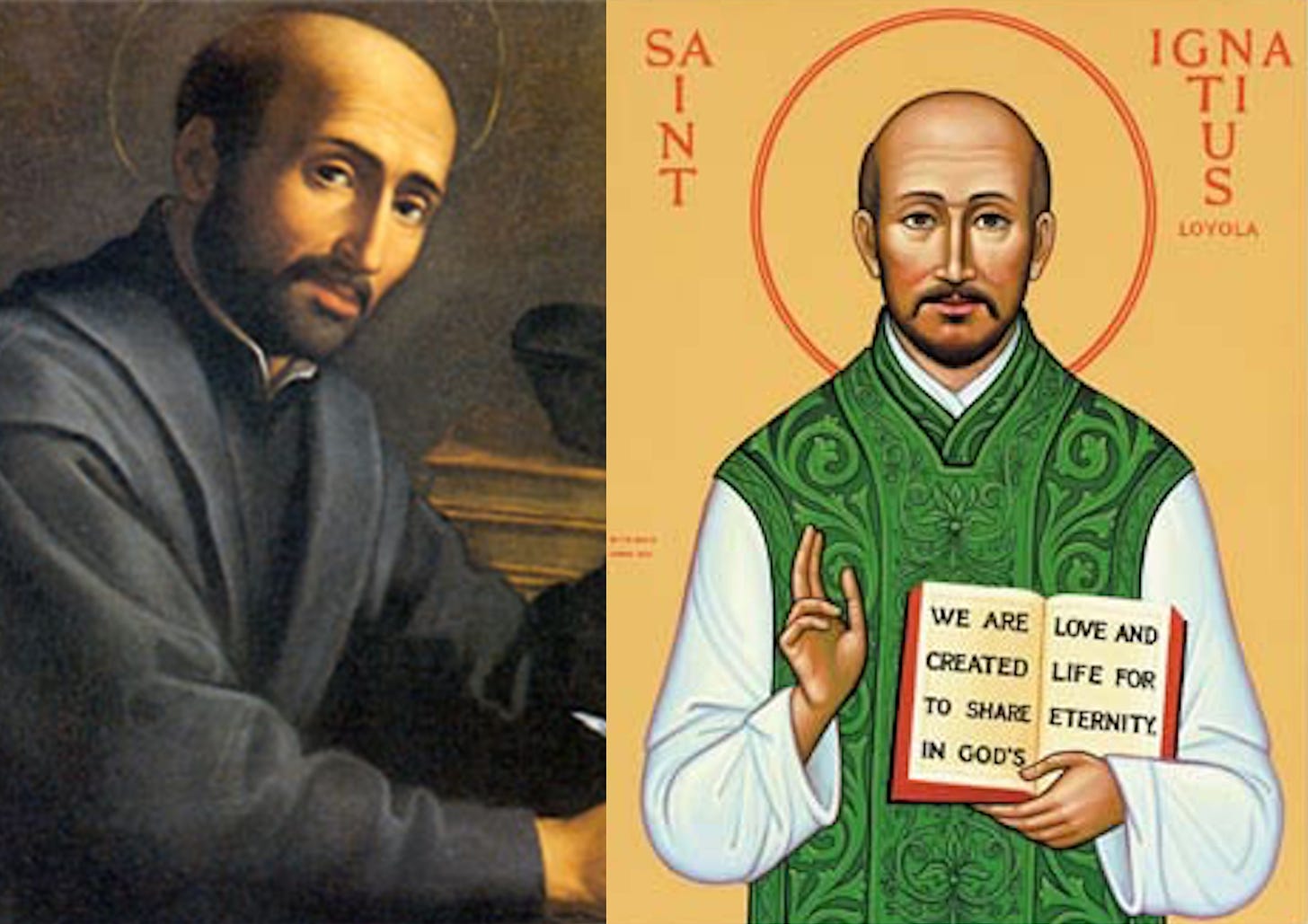July 31 – Feast Day of St. Ignatius of Loyola, the Spiritual Exercises and the Twelve Steps

I have the book: The Spiritual Exercises of St. Ignatius of Loyola. I’d tried to read it, study it, and bounce around in it. Then I’d put it away, not ever able to really “get into” it like I’d hoped. I purchased it years ago hoping to get inspiration and understanding about myself and my relationship with God. But the book was over my head. I couldn’t sustain my interest long enough to really incorporate the exercises into my life in any meaningful way.
I remember thinking, “I wish there was a “Spiritual Exercises” for Dummies book I could read. I laughed at this thought when I considered that’s basically what the 12 Steps are. I know, not really but sort of Spiritual Exercises for Dummies.
But that didn’t satisfy me either. The 12 Steps were too simplified. And truthfully, they relate only to a small part of the vast Exercises. I wanted the meat of what St Ignatius of Loyola taught but not so simplified it watered down the most important aspects of devotion to Christ and life in the Church.
I am “working the steps” again. In AA. It is called “working the steps,” the same way I suppose St. Ignatius called it “practicing” the Spiritual Exercises. Both are intended to be a “way of life,” if practiced daily promised to improve our relationships with God and other people. I don’t believe my salvation (my sobriety, yes but not my salvation) lies in the 12 Steps, as some swear. I believe I’ve indirectly practiced the Steps my whole life through my Catholic Faith. But by intensely directing these principles and practices at my alcoholism, however, I’ve been able to arrest the destruction and trajectory of my life, turn away from alcohol and to God. A micro-conversion of sorts. I didn’t need to be converted to believe in God; but I needed to apply this conversion principle specifically to my alcoholism.
My 17-year-old son attends Catholic school and came home a couple of months ago with a homework assignment comparing the 12 Steps “process” of Alcoholics Anonymous to the Sacrament of Reconciliation. I was giddy excited about this and asked him if I could have a copy of it and mention in in my blog. He said, “Sure.”
These were my son’s answers:
Step 1: Sorry for sin and realizing we have done wrong.
Step 2: Realizing God is merciful
Step 3: Contrition
Step 4: Examination of conscience
Step 5: Confessing our sins
Step 6: Going to confession
Step 7: The Act of confessing our sins
Step 8: Atonement and satisfaction
Step 9: Penance
Step 10: Daily Examination of conscience
Step 11: Engaging in prayer to overcome our problems
Sept 12: Seeking to help others
Fr. Edward Dowling, a Jesuit and friend of Bill Wilson, the founder of Alcoholics Anonymous, was convinced that the Spiritual Exercises influenced the 12 Steps. Bill Wilson said he had never heard of Ignatius or the Exercises. He said he sat down at his kitchen table one day and wrote out the 12 Steps in about 20 minutes. The principles of the Spiritual Exercises were the same principles that inspired Bill Wilson to write the Steps, but there is no direct connection apparently.
AA was about five years old when Bill W. met Father Dowling. Bill was depressed and had thoughts of giving up. Father Dowling had heard of AA and saw similarities between the 12 Steps and the Spiritual Exercises; and he set out to meet Bill to learn more. Bill writes this meeting re-inspired him and gave him the grace he needed to persevere. His depression lifted. When their initial meeting together was over, Father Dowling told Bill W. if ever Bill grew impatient, or angry at God's way of doing things, if ever he forgot to be grateful for being alive right here and now, he, Father Ed Dowling, would make the trip all the way from St. Louis to “wallop him over the head with his good Irish stick.”
Father Ed did give Bill a copy of the Spiritual Exercises in 1952, underlining the "Two Standards" meditation. Father Ed reminded Bill of the place he had bottomed out and surrendered to a “higher power.” Father Ed believed that this was the place where humiliations led to humility and then to all other blessings. In saying this, he paraphrased Ignatius's closing prayer of the "Two Standards" meditations. This was where AA became most like the Exercises.
When we forget to hold God as the center, something else will surely take God’s place. When we take our focus off God—pushing love, humility, and service to the side—something insidious creeps into us, turning our passion into poison. Sometimes we create our own demons without even knowing it. The Two Standards meditation isn’t a choice between the good and evil that’s out in the world—it’s a choice that lies within one’s own heart.
After the death of Father Dowling, Bill Wilson wrote, “Father Ed, an early and wonderful friend of AA, was the greatest and most gentle soul to walk this planet. I was closer to him than to any other human being on earth."

